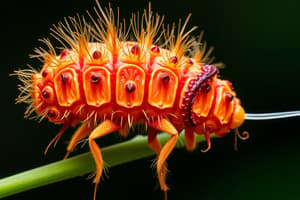Podcast
Questions and Answers
What is the main focus of biology as a scientific discipline?
What is the main focus of biology as a scientific discipline?
- Investigating living organisms and their characteristics (correct)
- Exploring geological formations
- Studying the weather patterns
- Analyzing chemical reactions in laboratories
How do biologists describe the processes by which species evolve over time?
How do biologists describe the processes by which species evolve over time?
- Through analyzing planetary movements
- Through investigating astronomical events
- By studying genetic mutations and natural selection (correct)
- By observing chemical reactions in the environment
What has significantly advanced the understanding of human genetics?
What has significantly advanced the understanding of human genetics?
- Analyzing cloud formations
- Studying the behavior of marine animals
- Investigating volcanic eruptions
- Techniques like DNA sequencing (correct)
What do geneticists aim to achieve by manipulating genes and creating 'designer babies'?
What do geneticists aim to achieve by manipulating genes and creating 'designer babies'?
How do biological systems function in terms of interactions according to the text?
How do biological systems function in terms of interactions according to the text?
What role do ecologists play in understanding biological systems according to the text?
What role do ecologists play in understanding biological systems according to the text?
Study Notes
Science is an interdisciplinary field of study, encompassing many areas such as physics and chemistry, among others. However, one crucial branch within science is biology. Biology is the scientific discipline that studies living organisms, their structures, functions, growth, origin, evolution, distribution, and other aspects. It seeks to understand life and explore its mechanisms. At its core, biology involves studying the processes by which species evolve over time through natural selection, genetic mutations, gene expression, and more.
Biologists seek to describe how various components interact with each other. For example, they might investigate the relationship between ecological factors like climate change and animal behavior. In this context, biological systems become complex models of interactions where both individual parts, known as genes or cells, and whole systems can perform behaviors driven by underlying rules, much like computer programs.
Moreover, understanding human genetics has advanced significantly due to modern techniques such as DNA sequencing. This enables scientists to pinpoint specific traits associated with certain diseases and conditions, potentially leading to cures. Geneticists have also been able to manipulate genes and create 'designer babies' - children whose parents select desirable traits before conception, using IVF technology.
In summary, biology is an essential part of science that explores everything from microscopic molecules to entire ecosystems, shedding light on these subjects and providing insights into our world.
Studying That Suits You
Use AI to generate personalized quizzes and flashcards to suit your learning preferences.
Description
Explore the scientific discipline that delves into the structures, functions, growth, evolution, and mechanisms of living organisms. Learn about the processes of natural selection, genetic mutations, and gene expression, and how they shape the diversity of life on Earth.




